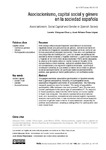Asociacionismo, capital social y género en la sociedad española

View/
Use this link to cite
http://hdl.handle.net/2183/39158
Except where otherwise noted, this item's license is described as Atribución-CompartirIgual 4.0 Internacional (CC BY-SA)
Collections
- Investigación (FSOC) [405]
Metadata
Show full item recordTitle
Asociacionismo, capital social y género en la sociedad españolaAlternative Title(s)
Associationism, Social Capital and Gender in Spanish SocietyDate
2024Citation
Vázquez-Chas, Loreto; Pena-López, José Atilano (2024). «Asociacionismo, capital social y género en la sociedad española». Revista Española de Investigaciones Sociológicas, 186: 143-158. (doi: 10.5477/ cis/reis.186.143-158)
Abstract
[Resumen] Este trabajo estudia la participación asociativa en la sociedad española desde una perspectiva de género, centrándose tanto en los niveles de integración asociativa (equidad vertical) como en las formas asociativas (equidad horizontal). Para ello, nos planteamos dos preguntas de investigación: ¿son los niveles de participación asociativa entre hombres y mujeres distintos? y ¿participan hombres y mujeres en el mismo tipo de asociaciones? Para darles respuesta se analiza la Encuesta sobre el Capital Social en España 2019, representativa a nivel nacional, realizando análisis descriptivos, de correlaciones y de regresión logística ordenada. La principal conclusión obtenida es que existe un lastre de los roles de género sobre el asociacionismo, en particular sobre el asociacionismo político, que genera un techo participativo y en confianza social. [Abstract] This paper examines associative participation in Spanish society from a gender perspective, focusing on participation levels, associative integration and forms of associationism. The following research questions were formulated: “Do levels of associative
participation differ between men and women?” and “Do men and women participate in the same type of associations?”. To respond to these questions, data from the 2019 Survey on Social Capital in Spain was analyzed. This data is representative at a national level, and descriptive, correlational and ordered logistic regression analyses were performed. It was concluded that evidence supports a burden of gender roles in terms of associationism, especially for political associationism, creating a ceiling effect for participation and
even social trust.
Keywords
Capital social
Confianza general
Género
Participación asociativa
Social capital
Social trust
Gender
Associativeness
Confianza general
Género
Participación asociativa
Social capital
Social trust
Gender
Associativeness
Editor version
Rights
Atribución-CompartirIgual 4.0 Internacional (CC BY-SA)
ISSN
0210-5233






